As you can probably tell by now, I am devastated beyond words that my (in name only, in all other ways former) country chose to elect hate. Even those who didn't vote for hate per se felt it was an acceptable part of the package, which is itself an act of hate - no matter the reason - that I do not forgive.
It's not so much that I particularly loved Clinton, though I was excited to vote for the first female president with a serious chance, and I do not think she is the bloodthirsty vampire-she-beast that many have come to believe she is. And it's not that I am so devastated after every Republican win - I'm not (okay, I'll admit that when I moved to Taiwan I trolled my coworkers saying it was because GW Bush was re-elected, and I'm not sorry for this real life troll job, but that's what it was - a few lulz, nothing more. I left for other reasons entirely).
Now, though, I have come to feel more than ever that Taiwan is my home. I hadn't planned on returning to the US in any case, but it was always on the table, potentially. Maybe we'd have elderly relatives to care for, or maybe one of us would get a blockbuster job offer. New York seemed like a fine city if we could afford it: I could continue to treat mass transit as a core belief, and not have to buy a car. It might have happened.
That is all gone. I do not think I can return for more than a visit. Ever. We may not stay in Taiwan, but I truly cannot imagine moving back to the US. Not because of Trump itself, but because the people who voted for it (remember, a thing who openly bragged of sexual assault and ran a campaign with very strong, obvious messages of racism, who has already said it plans to take away my medical rights as a woman) will still be around, and I do not imagine that I can peaceably share a country with them. Forget anger - though there is that - I just don't think my psyche could take it.
And yet, I do feel a sense of guilt about this. A lot of people say they're going to move to Canada if so-and-so wins, and with Trump, that rhetoric was stronger than ever. I am in the fortunate position of being able to do so fairly easily. I married into the nationality because I'm smart like that.
But, then, another call came: don't move to Canada. The US needs you. It's a privilege to be able to leave, when those who will really suffer under Trump's regime perhaps can't leave, but will definitely lose allies and accomplices if you go. You need to be there to protest, to resist, to get involved, to fight back. To register yourself as a Muslim if it starts putting that Nazi-like shitshow into action. To walk women into abortion clinics and put yourself physically between a harasser and a minority being harassed. To provide help and possibly housing for refugees (potentially domestic ones, and I am not joking). To join local groups and donate to national ones. To get your ground game going. We need people to fight, not to run. To occupy.
I get it - and the argument is persuasive. I love a good fight, and that is something I do have the constitution for (certainly I don't care much what people think of me, and am quite happy to say what I think and stand up for what is right under my own name).
In fact, if I lived in America, I think I would stay for this reason. To make people who want to implement a racist, sexist agenda and set back our collective cultural clock to a racist, sexist time as miserable as fucking possible. Like, if you thought I was a bitch before, you ain't seen nothin' until I've got something real and tangible and scary to fight for.
Hell, I could probably even find common cause with decent, fundamentally morally good conservatives who also hate Trump and everything it stands for. The basically okay folks who believe in personal freedoms (as long as they leave mine and my loved ones' alone in terms of who they marry or what medical choices they make - I'll even leave their guns alone in good faith), the folks with a conscience even if we disagree on some things, who have a similar idea of where we should go as a country but maybe have different ideas on how to get there (some of which are terrible, but that can be worked around civilly. Probably some of mine are too).
The thing is, though, that I don't live in America. I haven't for a decade. Does the call to stay and resist apply if you weren't there to begin with?
After careful thought, I have decided that it doesn't. There are good reasons why I consider Taiwan my home, and most of them actually don't have to do with my anger at the country I was born in. Those are not invalidated. Taiwan is still my home, and would be even if I came from the Land of Peace and Bubbles (a.k.a. Denmark, apparently?).
So, it is acceptable to decide to continue to live abroad guilt-free. If Clinton had been elected I would not have returned permanently, so this doesn't change that - all it changes is that now, even in the future, I won't. I do not imagine Trump will be president for more than four years, but even if it is, as someone who was already gone, I do think it is morally permissible to stay gone.
That said, I am still in the resistance. I do not consider myself absolved of my duty to fight as a decent human being who was born in the USA. Not because we "lost" - we've lost before. Who cares. It happens. But because this is actually terrifying in a way it never before was in my lifetime, in a way that could truly hurt many people I care about who happen to be LGBT, or Muslim, or Hispanic, or women who may need abortions, or whomever our brand new white supremacist in the White House may seem fit to target. This is some real honest-to-goodness Greatest Generation shit right here and we need to resist. We need to put ourselves at risk and maybe be uncomfortable. We need to start thinking about who stands to suffer most and figure out how we can either stop that from happening, or be of help when it does.
This leaves the question of how. From Taiwan there is not that much I can do. But there are a few things.
First and foremost, donate donate donate donate (I can't find a donation page for that last one, but if you can, you should try to help them stay afloat - here's why). Money is one thing that crosses borders easily. This is the first thing I plan to do once my next transfer to my US bank goes through.
Secondly, if at any point this whole super-duper-Nazi "Muslim registry" actually goes into effect, if you are abroad but able to do so online, register as a Muslim yourself to confuse the thugs. (You can sign the petition if you want, but that's not really the point - the point is to keep your ears open.) Or, do it on your next visit home, if it becomes a real thing. It can't target Muslims if it doesn't know which registrees are actually Muslim, and if you are targeted yourself, consider it as taking the place of a Muslim who now has the extra time to get away.
Thirdly, you are still a citizen. You can still vote. Call your representatives. Or write to them, though this is less effective. Sign petitions, join mailing lists, be a voice.
And finally, find out where the major protests are and plan your visits home around them. Make a sign, go march, occupy, do what you can. Confront your family members if you are at all able to do so. I am skeptical of this working much: while there may be some truth to the power of engagement, my experience has been that when someone calls someone else out as racist, it's not because the person they're calling out is talking about their problems and the listener is downplaying them or trying to tell them they're actually privileged. Replying to a story of economic woe or an opioid addiction crisis with "well actually you should be grateful because at least you're white, and if you don't see that you're racist" is cartoonishly insensitive - while I'm sure people like this exist, I have never met one.
No, it's because they are actually saying or doing something racist, and not calling that out normalizes it in an unacceptable way. I do not think Trump voters voted for racism because they're sick of being called racists. I think many of them voted Trump because they actually are racists, and whether or not you called them that, it wouldn't have changed anything (nor would being nice to them - no social movement ever got anywhere by asking nicely).
Side note: while I am sympathetic to someone's economic struggle, I don't excuse that as a reason to have ignored Trump's bigotry. Voting for it isn't going to bring those jobs back. The economy has been fundamentally restructured, and all these trade deals you don't like (guess what, I don't always like them either) are a by-product of that, not the cause of it. Only finding a place for yourself in the new economy - and maybe accepting some government help or getting more education (which you deserve to be able to afford) to do so - is going to change the situation.
Though I do not believe this is the main reason most people voted Trump, I am genuinely sorry - no sarcasm - that your Rust Belt job is gone, but Trump isn't going to be able to bring it back. Even if it could, re-investing in fossil fuels will render our skies gray again. That's not a solution. In any case, I have struggled too, and I did not grow up in a wealthy family. I never took that as an excuse to ignore racist rhetoric in a candidate because they said what I wanted to hear about jobs. It was always my job to educate myself and find a place in the economy. So I take this "reason" for voting Trump as a reason to improve education, so people might better understand when a candidate's promises are not possible.
Perhaps I am a flawed person, but I do not think it is ethically right not to call out overt racism, nor do I think I have the constitution not to do so. But, I suppose you can try. Hail Mary, right?
Maybe don't bother with a safety pin on those visits - I guess you can if you want, I can't be bothered with that argument, let's not fight please - but do keep your eyes open for instances of harassment and physically intervene. You are only there temporarily but the person being harassed has to live with the threat of it every day.
Two more things - stop believing and posting bullshit from fake news sites (feel free to keep posting on Facebook: it's not that productive but it is therapeutic and helps people hone their real-life arguments, so there is some benefit). Get your real argument game on, get facts, listen to real media with real fact-checkers and trained journalists who are at least trying to be accurate. Subscribe to an online news source and actually pay for it so we can keep real media alive.
And - remember, Taiwan needs you too. The appointment of a few Taiwan-friendly folks to the cabinet is a good sign, but Trump's utter disregard for any sort of international diplomacy that doesn't result in a shower of shiny gold coins or telling brown people to get lost is still worrying. So be present and engaged and ready to fight for Taiwan if the chance presents itself.
There will be expats here, and some will support Trump. Engage with them if you feel you can, or avoid them (I do not necessarily think it is bad for someone who voted for a racist agenda, even if that's not why they voted for it, to feel a bit ostracized). Watch out for increased harassment and other hate speech among your fellow expats, and step in as necessary.
No matter what, if you plan to stay abroad - even if you plan to never return and quite possibly someday renounce citizenship as I do - don't think this absolves you from the fight.
Trumpio* delenda est.
*I have no idea what declension to use because I forgot all my Latin. So I made this one up.
Wednesday, November 16, 2016
Monday, November 14, 2016
Unity
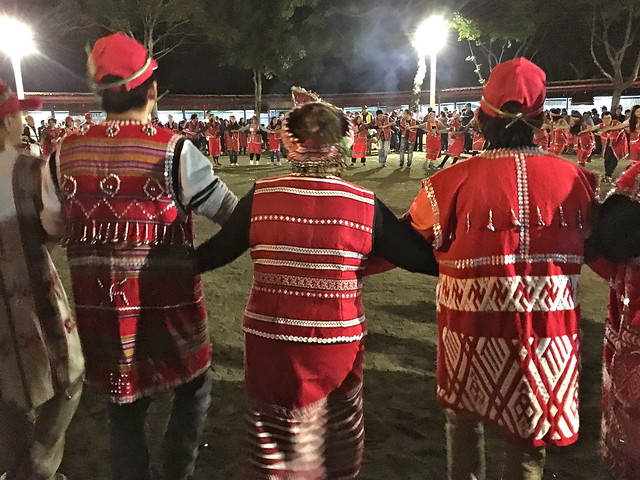
This year, I attended the Grand Pas'ta'ai festival in Wufeng (Hsinchu County) - my first Grand Pas'ta'ai but my third one in total. There is not much more I can say about it that hasn't been covered in these two previous posts from 2008 and 2010, but I do want to quickly note my observations of what made this one the "Grand" one.

First, the Grand Pas'ta'ai is the only one where they bring out this long pole with red and white flags - I am sure one of my more knowledgeable friends knows what it's called. I was told by a bystander that it is extremely tall so as to reach to the heavens, to ask for blessings. Every few hours a group of people form an open circle around it and run around the regular dancing circle chanting rhythmically.
Secondly, there were more instances of running together into a circular group around one of the ceremonial placards - again I am sure one of my more knowledgeable friends knows why and can provide answers in the comments. I am not an expert. There were also more of these placards - which are shaped like open funnels to, I was told, entice the ta'ai (the 'mythical dark skinned wizard people' that the Saisiyat apparently massacred in ancient times, and now pay homage to by inviting them to this celebration around harvest time biennially) to join the celebration and give their blessings.
Finally, it's simply larger. In previous years we could always find a place to sit, and the dancing circle was fairly small, even when the public was invited to join. This year, the bleachers were packed, and the circle huge - at many points concentric circles were necessary. More or less every Saisiyat in the area attended, I was told, and many more people than usual were dressed in traditional garments.
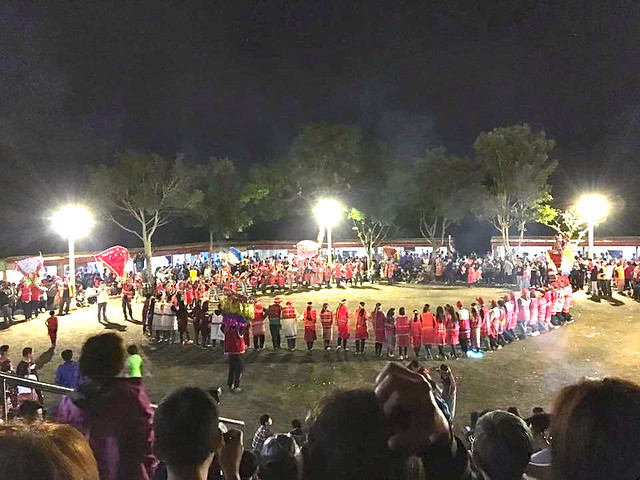
Now, I'd like to talk a bit about what made the event different for me this year. We stayed until dawn this year, and I will say that doing so does give one a different perspective on what this festival is like (the entire thing is held over three days, and for a real experience, try going for all three).
I did not get drunk this year - we were in charge of a rental car that folks who came with us drove out of Taipei, but we drove in the mountains. Although we theoretically had a ride to our homestay without having to drive (I figured I'd be drunk), deep down I knew I'd end up driving that car in the morning and intentionally paced myself. So did Brendan, but I also know that I am more able to cope with having stayed up all night and be present, coherent and in a state to drive after having done so (I just handle lack of sleep better than he does).
It also seems pertinent to point to a link between my experiences at Pas'ta'ai and recent happenings both in my somewhat-former social circle and the world.
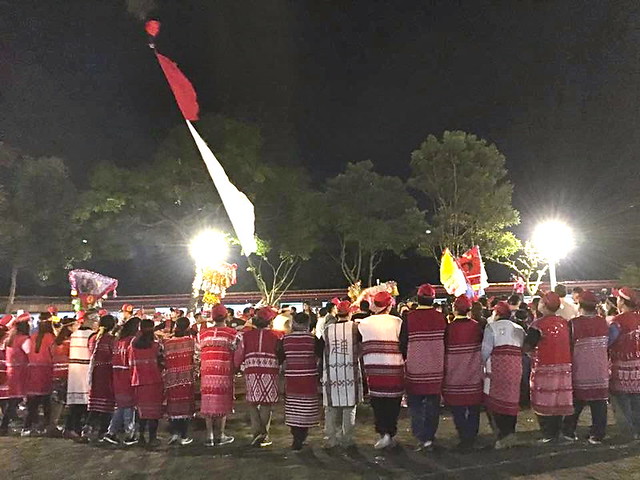
Around 3am, I took a walk around the back end of the ceremony site, where there is a covered walking area and several covered rooms where people can sleep, rest or put there things (it is pertinent to note that you do not have to fear for the safety of your personal belongings left unattended, as this plays into the next point). I came across two drunk teenage boys, both named Watan. In fact, I suspect one of them forgot his name and just called himself by his friend's name. They both started kinda-sorta hitting on me, one shouting "I AM SAISIYAT PEOPLE, I LOVE YOOUUUUU" before falling backwards off the ledge he was perched on (he was fine). The other kept half-coherently flirting while touching my shoulders and arms in a way I am not comfortable with any teenage boy doing - or really anyone I haven't implicitly invited to do so doing - let alone any drunk teenage boy. They were harmless and I wasn't scared or even bothered. But, I was trying to politely disengage.

While this was happening, an older man was off to the side watching, and keeping a careful eye on the situation. He eyed me with the clear signal saying "Do you want me to intervene?" and I eyed him back with "I'm fine, thanks" and smiled at him as I finally, successfully, did disengage and go about my walk. It was clear that he was ready to step in.
This is not a story of drunk aborigines - frankly, that's about as stupid a narrative as talking about how drunk Westerners like to open a bottle of brandy on Christmas, so what? - which is a harmful stereotype. I see no issue with drinking scads of your local tipple on a big holiday. This is a story of what it takes to create a safe community and event. Saisiyat and Northeast American culture are as different as two cultures can be, and yet both me and this dude understood, on a universal level, how to respond to situations that could escalate into harassment or assault or even just making women feel uncomfortable. We both knew the universal Look of a bystander and a person in a situation.
There is no "cultural difference" where sexual harassment is concerned - to be clear, I do not think the drunk kids were sexually harassing me, and I really was not angered, offended or traumatized. In fact, it was kind of funny, because I knew I wasn't in any danger. But I see how it could have become that, and how someone watching it happen might have thought so. And there is no cultural difference when it comes to the collective responsibility of a community to keep their spaces and events safe and welcoming for all people.
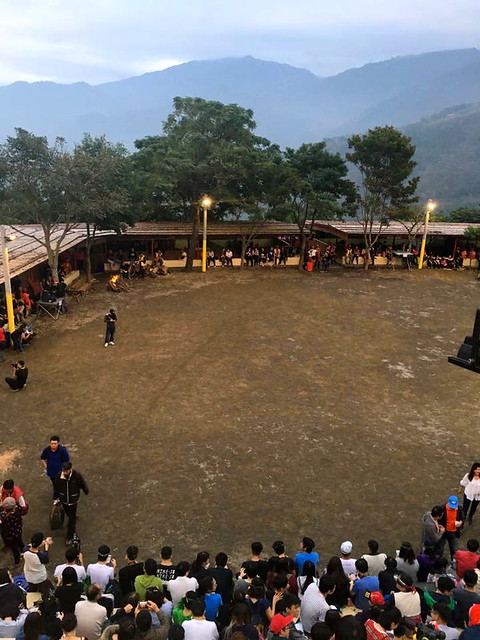
Let me reiterate, in case the point is not clear: a man at an all night dance party where approximately 100% of attendees are drunk (and this is expected, accepted and even encouraged), from a completely different culture, with whom I barely share a common language (because my Chinese isn't fluent - I am sure his is fine - and I do not speak Saisiyat), understood that collective responsibility. He got it. There was no "well public spaces aren't safe, women have to protect themselves (oh but everyone is welcome and happy)", none of this "you should be more careful", "it's not my job to create a safe event for women", "maybe you should protect yourself by learning self-defense or carrying mace", "I can't kick the harasser out of a public event" nonsense.
None.
Women at Pas'ta'ai are safe, because the community collectively ensures that they are.
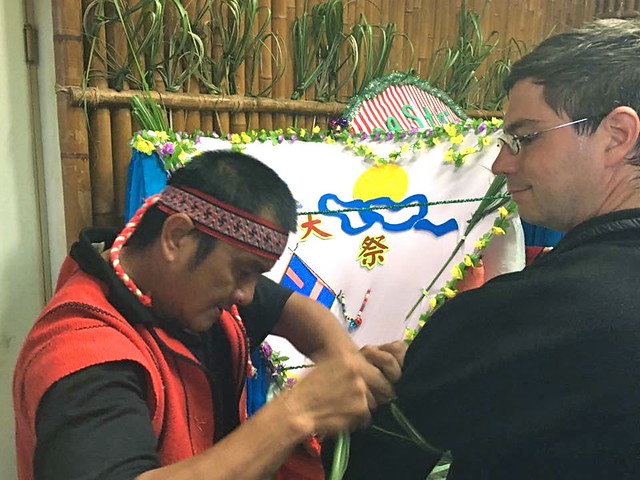
It really shows why I have no patience or sympathy for lily-livered "progressive nice guy but actually not an ally" claptrap, let alone right-wing or alt-right misogyny. It is not normal. This guy, at this event, is normal. With one look he made sure I knew he had my back. He didn't even have to intervene, and yet it was quite clear that women can expect safety. This is how it should be.
If you don't think you too have this responsibility, remind me not to attend your events.
This, too, bleeds into the absolutely devastating - to many of us who value progressive society - Trump win.

I've said it all on Facebook, but here we go. If you are calling for "unity" or asking us on the progressive left to "listen" and "empathize", I am not interested. There are many reasons - for example, the idea that Trump supporters voted that way because they are economically desperate is false, and even if it were true, it doesn't matter because voting for Trump was never going to bring back jobs that have irreversibly disappeared, or that Clinton is somehow "dishonest" (not really more so than any other politician and far more honest than Trump).
But they don't matter either - because there is no reason or excuse - not even one - that I can or ever will be able to accept for why one voted Trump.
Not. Even. One. Zero.
If you voted for someone with hate speech like that, on some level, you decided hate speech was okay. You decided it was acceptable enough to allow into the White House even if you do not personally say it. I do not care how much you hated Clinton, or how hard it is for you. I am not interested in your excuses for why hate speech was acceptable. Your reasons do not matter to me.

You decided it was acceptable to elect someone spewing hate speech, which is inherently a bigoted act. It is not enough to be personally okay or not bigoted in your daily life. You have to actively stand against it, or at least not vote for it, in order to qualify as a good person.
I am not interested in unity in this way - and calls for it do not sway me. If conflict is what is needed to defeat Trumpism, then although I don't like it, it may simply be what has to happen. I am surprisingly okay with disunity when the other side voted for hate speech.
But I do feel unity, just not with the US. At the end of the ceremony, as the night slowly turned to dawn, most people still at Pas'ta'ai came together in a circle and moved more or less together as we held hands and the tribe members sang (whether they were folk songs, just typical popular songs, traditional songs or hymns or other sacred music, I do not know). There was some pulling and discomfort, and not everyone was moving perfectly in sync. Occasionally our hands tore apart, but they always came back together. I was extremely tired and just sort of let the music sway me as I watched other people's feet, looking for the rhythm so I could do my part to keep the circle moving in time until the sun peeked out over the mountains beyond the ceremony grounds. Not just with Saisiyat participants but Taiwanese visitors of many backgrounds as well as other foreigners. All were welcome, and we collectively came together to ensure that all were safe. We probably disagree on some things, and maybe have differing values, but I could be sure we all more or less agreed on what the end goal was even if we had differing ideas on how to get there, and in that sense, we could work together.

I thought back to the man who waited to see if he needed to intervene, and I thought about how my belongings were safe. I thought about how the majority of Taiwanese are interested in putting aside their past differences - Hoklo, waishengren, Hakka, aborigine or of non-Taiwanese roots - and moving forward. Perhaps not everyone, but enough to create the feeling of desire for change in society - change for the better, for all Taiwanese. I thought in my fuzzy sleep-deprived head about how, while Taiwan is not perfect, at least it is looking in the right direction. How Taiwan would never vote for someone like Trump - how open racism (including Islamophobia) and misogyny - even bragging about sexual assault - would be automatically disqualifying. I thought about how, even though I do not care for the various KMT candidates nor all of the DPP ones, that after the elections are over we can all more or less agree that voting for either candidate doesn't make you a bad person, and relationships resume as normal. In the past this also happened in the US - I may not have liked Bush, but he was more or less normal and acceptable within American democracy. In Taiwan, every candidate is at least nominally qualified and always educated enough to take on the role he or she is campaigning for.
I thought about how Taiwan elected a female president without much fuss at all and the majority of Taiwanese were annoyed, not turned, by attempts at making her singlehood and sexual orientation (which is unknown, but who cares?) into a scandal.
I thought about how Taiwanese fought for and won transitional justice, and when they do finally get marriage equality (one hopes within the next year), chances of people committing hate crimes against LGBT+ people are slim to none. Nobody's going to refuse to issue licenses, either. Such a stark difference from my own country.

And as we danced together, arms linked, and I grabbed the hands of people to either side of me regardless of who they were and we all tried to dance together, that I am interested in unity.
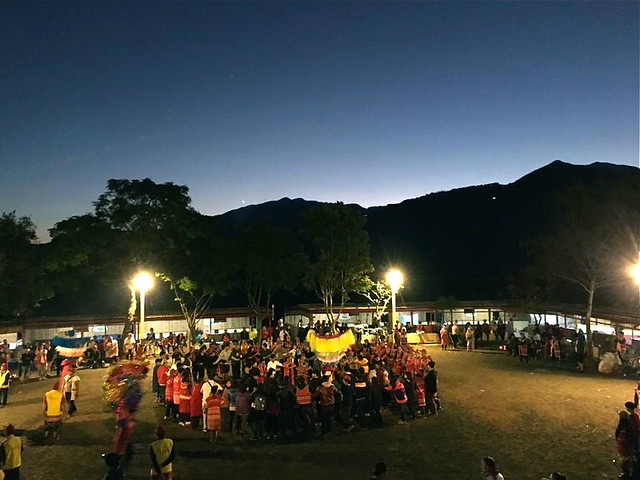
Unity based not on ethnicity or culture - I'll never be Saisiyat or "ethnically Chinese" in any way, though I would someday like to be Taiwanese - or even on totally shared values, as we all have to deal with people who think somewhat differently from us. But unity based on being fundamentally decent versus indecent - which is really the problem in the US. It's not liberal or conservative (I can find some points of agreement with conservatives on personal freedoms, for example) or "this person won and that person lost but they are both fundamentally decent people", which is how every previous election has been. This is different. This is indecent, this is a rhinoceros. I am not interested in unity where aggressive action is called for. I am when everyone involved is more or less working toward the same goal, though we have different ideas about to get there, and looking to the future with a progressive and tolerant eye, where people have "something" in them that knows right from wrong, where hate speech is not welcome.
I do realize that totalitarianism can hit any culture, and there are negatives about Taiwan (here's one example) that I could discuss, but fundamentally I think the culture is in a good place, and decency still reigns here.

I cannot say this is true of my country right now, where I genuinely feel that the only thing separating Trump and Hitler is that Trump is too stupid to have a master plan, but I see no difference between Trump voters and Nazi voters (who, remember, were not all Nazis themselves - some just looked the other way).
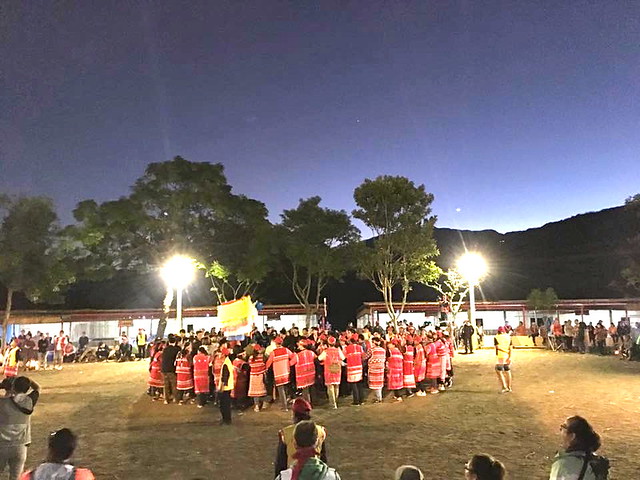
I'm interested in Taiwanese unity - not unification, mind you, but unity. And while I must hold an American passport for the time being, I can no longer consider myself truly American in any real sense.

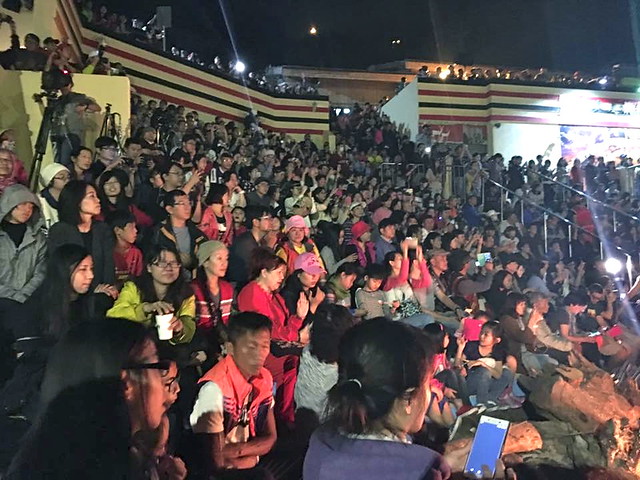
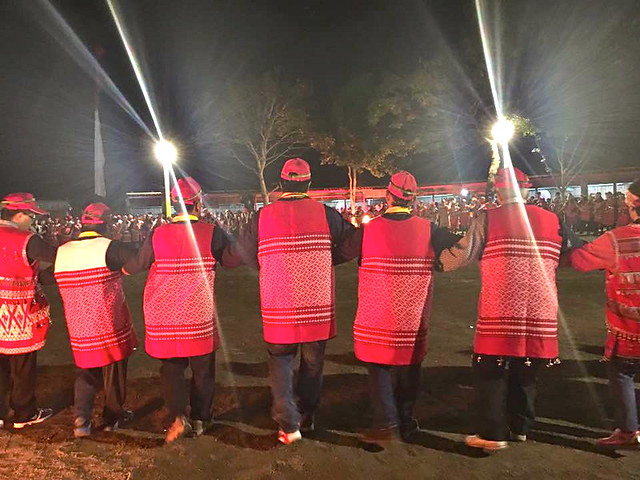


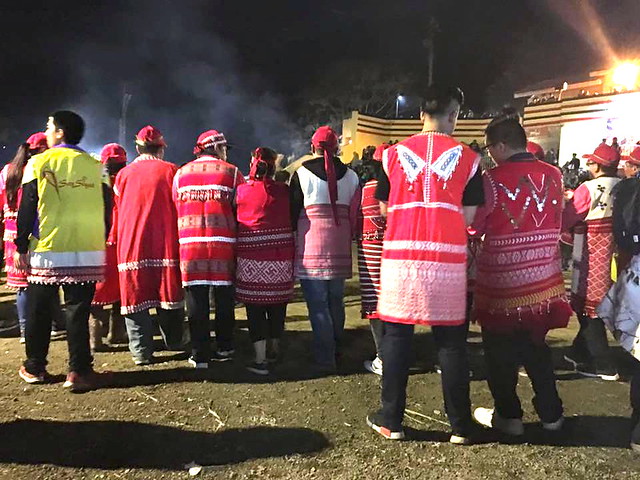
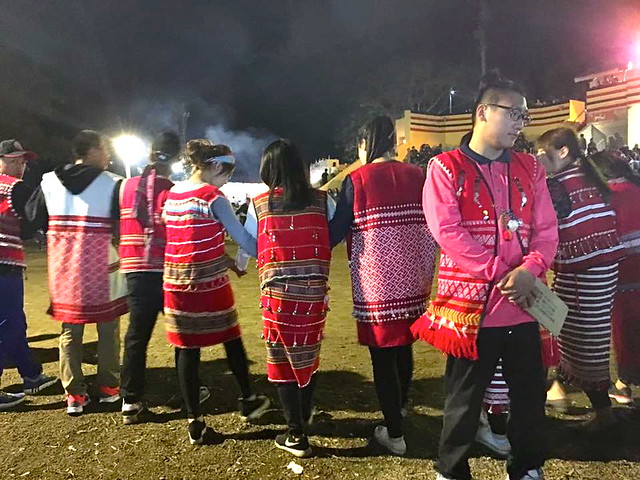
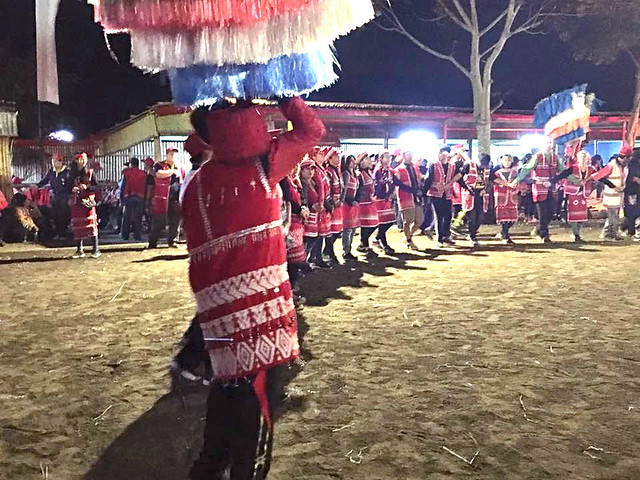
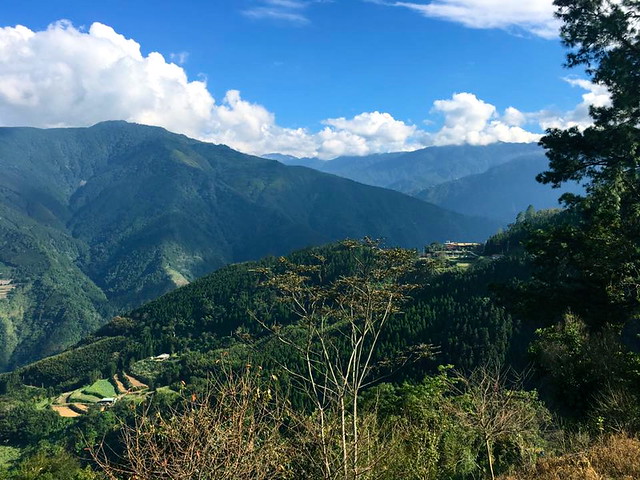
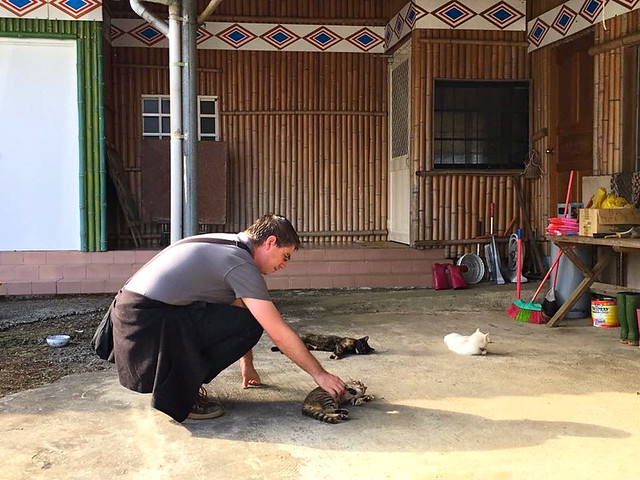
https://www.flickr.com/photos/53660106@N02/30981155555/in/dateposted-public/
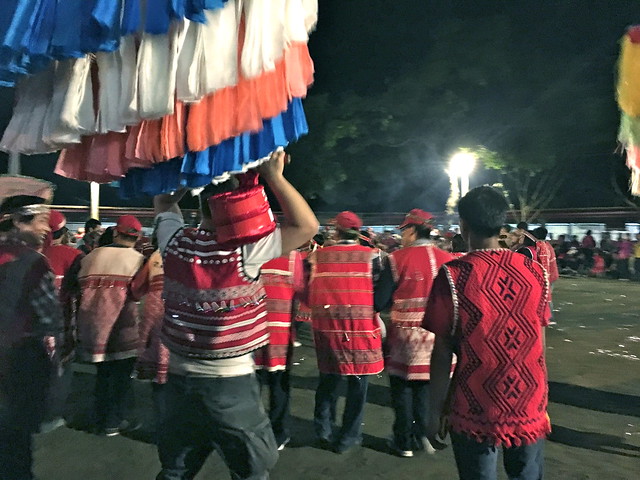
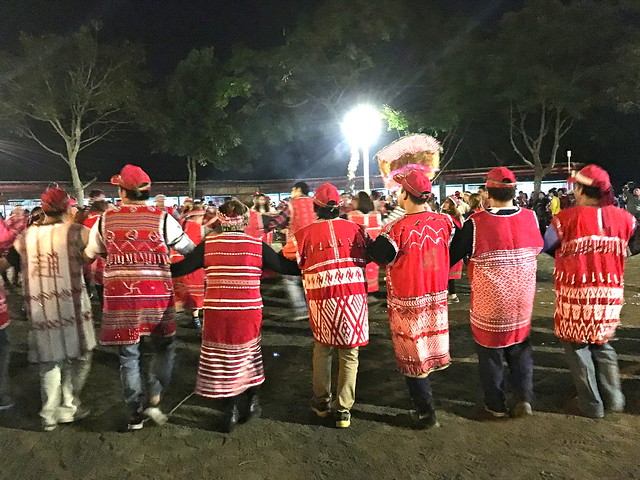
Monday, November 7, 2016
Of Jellyfish
A woman in Taiwan attends an event - a popular get-together inclusive of both Taiwanese and expats, billed as "family friendly". During that event, she is groped by an outgoing man who attends many such events. It is not a case of accidental brushing and not a misunderstanding. He grabs and fondles her butt, at length, and when she says something he all but admits it:
"What are you doing?"
"I'm looking for your ass. I can't find it!"
She doesn't know what to do - her first thought is that she doesn't want to 'embarrass' an older man. Only later does she begin to feel that his comfort level is neither her concern nor her priority: he deserves to be embarrassed for what he's done. She lets it stew for awhile, and finally e-mails the organizer (insofar as this event has one - there is someone very nominally in charge).
He asks for information on what happened. Then, as the victim describes it, his response is to say he's not going to do anything about it - it's her responsibility to either avoid or confront him but he doesn't want to make anyone feel unwelcome at the event. He says the groper has a "reputation for being 'friendly'", although what this means is unclear.
She feels that this is not acceptable - that by allowing someone who fondled her roughly and didn't even act embarrassed about it to attend, she is being made to feel unwelcome, and that the event has some nominal responsibility to ensure some level of safety for its participants (whether or not the organizer agrees is unclear).
He then agrees to post a notice and clarify that sexual harassment is not acceptable, and does, using her wording. But when pushed, he admits he can't do much to physically ban an assailant from the event as it is "public". He does, however, ask the groper not to return. He wants to use the wording "she doesn't want you to return". She feels this is not acceptable as it put it all on her, when the problem is the groper's behavior. The organizer agrees to change it.
She still feels the response is not good enough.
I happen to agree in a more general sense: women are being told they are "welcome" but sent the message that an even nominally safe environment (as much as any environment can be totally safe) is entirely their responsibility. Up to a point, if pushed, those nominally in charge will stand up for her. Beyond that point, she's on her own. This is exactly how women come to feel unwelcome.
A lengthy discussion ensues. Many, but not all, women support her. Some, but not all, men either call her claim into question, imply it may have been less serious than it was, or pull a classic "victim blame" - if you wanted an absolute guarantee of safety you shouldn't attend. People do say it's your job to protect yourself. Few people say it's society's job to make sure assailants don't get away with it. The entire burden of confronting not just the harasser but the entire culture falls on her, and a few supportive women. Many who otherwise deem themselves educated, worldly and progressive, claim they have no responsibility to do anything about the environment in general or any specific incident. It's all on the victim to take action, 100%.
The group leans very progressive, and likely thinks of themselves as kindhearted people and gentle souls who come together in neighborly love and community spirit. So kindhearted, so neighborly - until something actually happens and then it's every woman for herself.
Or as one woman in Taiwan put it:
"I think there is a definite subset of liberal/left-leaning people, men in particular but not solely, who are paradoxically *less* self aware on the topic of rape culture specifically because they believe they're already "on the right side": they call themselves feminists; they vote for leftist candidates; they support transgender rights and equal marriage; etc. and thus they do not engage in introspection when confronted with the reality that they're tacitly supporting assault. I see this phenomenon contributing to the reaction from the [event in question]."
Enough of these "progressive" people don't think a woman needs or deserves the support she's asking for - at one point saying the whole issue is "manblaming" and then "reverse sexism" when it doesn't go quietly away - that she doesn't feel comfortable attending again. Several women she's talked to agree, and also say they will not attend.
I have been invited in the past, but I too will not attend. Not because I fear being groped, but because the entire thing reeks of the sort of environment I actively avoid: pansy-ass so-called liberals who act like they care about what is right but when problems get real, their spines collapse and they blubber away like so many weak-willed jellyfish.
I want to be clear - I am not saying "this guy" or "that guy" or "the organizer" is such a person (I have my personal opinions but that is not the point). It's a general problem, endemic to many cultures, and being an otherwise openminded, progressive, liberal or even good person does not render one immune. Many people - both male and female - think of themselves in all of these positive lights, and yet when problems get real, they dive, dive, dive.
They are progressive and gender-egalitarian until a woman needs social support. They are giving and generous, until they are being asked to give by standing up to something insidious. They are exactly the sort of liberal that a liberal like me doesn't want to spend too much time with. They do not see this in themselves.
I wrote this account with the permission of the victim and purposely did not name names for two reasons: the first is because I was asked not to. Though given a choice I would name the groper, I'm not that sure it matters - while that particular ass-grab was the first I'd personally heard of blatant sexual assault in Taipei's expat-local mingling scene, talking to others revealed that there are many more. That's the second reason: my point is not "avoid this event" or "these two guys are bad". It doesn't matter - a name-and-shame won't do any good. The thing that needs to be said is that this is a generalized problem, and as safe as you think you are in Taiwan as an expat woman, there are a lot of people at a lot of events who don't have your back.
There is a creeper who runs around with probably-fake credentials and certainly-fake humanitarian causes who pervs out on women at expat-friendly events at the first opportunity. There is a guy banned from certain parties for his behavior. There are women who say that joining protests here increases your chances of being sexually harassed or assaulted, and the protest leaders - who are almost always male - either do very little about it, or try to swoop in with some knight in shining armor "how can we protect our women" nonsense that isn't what the women asked for in the first place. Even the nice ones. Or rather, the "nice" ones. Years ago, a Western woman told me about trying to join a photography club that had events held in English. It was almost entirely Western men, and she was the only Western woman. She wasn't told she was unwelcome, per se, but while some of the Taiwanese women talked to her the men more or less ignored her, or treated her patronizingly. She got the distinct impression that she wasn't wanted, and didn't return.
There are more.
In the Taipei-expat scene, especially where it bleeds into the local scene, you will meet a lot of interesting people. You'll also meet some losers but you won't dislike them too much. They will lean very progressive - Trumpists, tea party or "YAY BREXIT" troglodytes exist, as well as some very off-putting misogynists, tinfoil hatters and straight-up jerks. So, like anywhere really, except magnified because there are not that many Western expats in Taiwan. What you also learn quickly is that it seems as though the misogynists, Trumpist types and tinfoil hatters keep to themselves, and you will generally meet the leftie, hippie, possibly interested in "Eastern religion" (whatever that means) folks who seem pretty okay at first.
You will probably think they will be more supportive - after all, they just spent like five minutes telling you how strongly they believe in women's equality, right? You think either there aren't going to be perverts in their midst, or if there are, that you'll be able to get help. That people will back you up and support you without your having to insist several times. You do not imagine that you will be treated as 'demanding' or 'annoying' (even if nobody says those words) or be made to feel unwelcome, like the broad who killed the party, for speaking out.
What you then learn is that if you are ever harassed or assaulted at an expat gathering, none of the above is true. People will curl up in themselves like those bugs that turn into circles when you touch them. That's too bad, but it's a public event, there's really nothing we can do. Or, women basically have to protect themselves everywhere, it's not our job (wrong. It is society's job to stand up against its worse elements in solidarity with someone who has been harassed or targeted). If you are worried about being harassed, don't go (alrighty then, I'll just go back to the harem and watch everything from behind a screen). But he's really a nice guy, he probably didn't mean anything by it. Even worse, you might hear maybe she brought it on herself, maybe she was flirting with him. It's not the group's responsibility to deal with these incidents, if people exchange contact details, they can't be held responsible even if worse things happen (a real comment that was made - in Chinese though). It could be cultural differences (it wasn't, and even if it were, it's not like Taiwanese society is permissive of sexual assault, though to be fair the person who said this did so before the nature of the assault was clarified. He thought it might have been something like a kiss on the cheek - a bit weird in Taiwan but mostly permissible, perhaps even expected, in the West).
They will say quite a bit about what you can and should do to protect yourself - nothing terribly offensive in and of itself, but completely lacking in any awareness that it's a community's responsibility and society's responsibility to stand up for its members when they are treated this way. All about what you should do (which is fine) but nothing about what a group should do, or bystanders should do, to keep an event advertised as "family friendly" as truly friendly and welcoming to all (which is not fine).
Worse, that if you fear for your safety you should bring mace, or a taser, or pepper spray with you to defend yourself. Sure, I feel really super welcome and included at an event where the only way to ensure my safety is by carrying an electric shocker and mace, because I can't be assured the people around me will help me stand up against a harasser. Uh huh. Wow, the welcome-ness is astounding. Group hug!
What it adds up to is this: people talk about how safe Taiwan is. Women can walk down the street alone at all hours of day or night. The chances of being jumped, assaulted, raped or mugged are nil. This is all true, and Taiwan has a very low rate of these kinds of crimes. But it is not entirely safe for expat women, because expat men - and some women - are too gelatin-spined to come together to create a safe environment.
Again, I do not attend many big expat events, not because I fear for my safety or think I couldn't handle it if I were assaulted, but in part because I expect better of the people I spend my time with. The groper is at fault here, but to be a person of character you must also stand up to gropers. Look at the people around you. Do you think they would, if you were groped?
How is this different from basically any other country, even "progressive" or "modern" ones?
Beyond this flying in the face of people saying Taiwan is so safe (even though in many ways it is), it's also that the expat community, even as it blurs into the local one, is small. People know each other. I know the groper, the groped, and the organizer. I am upset and angry that people I thought of as friends - though not close ones - could do this (in one case) and react like this (in another). It's harder to avoid people, and it's hard to get people to stand with you against other folks they socialize with regularly. It's much easier to end up as the broad that everyone knows "killed the party", rather than just being able to move on. It is much harder to be anonymous - I don't even bother - and much harder to just find a new crowd if you find out your old one was full of gropers and rape culture apologists.
It's hard because, with an overwhelmingly male expat community - and not all of them even passing the nominal tests of being liberal and egalitarian, quite a few are straight up misogynists - often people just. do. not. get. that while, yes, people have to watch out for themselves, that there is also a responsibility of an event, a community or even a random crowd of people to work together to create a safe environment for all. That means standing up to sexual assault or harassment when you see it happening to someone else, as well as taking action when you are in any sort of position of power to do so after the fact, if you hear about it. This is important and it is the only way we are going to defeat rape culture. It is also the only way women are ever going to be able to feel as fully welcome as men at any public event.
I know how difficult it can be - I once had a party where one guest verbally assaulted another. It wasn't as blatant as, say, racial slurs but he was absolutely very angry about racial dynamics that had impacted his life in the past. While I have sympathy for that, it was no excuse to go after my friend as an individual, who had done nothing wrong, because he happened to belong to the group he maligned. I did try to stand up to him, tell him to stop, insist on changing the subject. He wouldn't. I didn't like him very much - he was my friend's boyfriend, not my friend. I felt later that I should have physically stood up and, regardless of how it might make his girlfriend (my friend) feel, tell him he must either stop immediately or leave. He did eventually stop without my having to do that, but I should have taken a firmer stand. So I get it, it's hard to do. That's why it is imperative that people of good character look back on their mistakes and missteps and consider the future, and how they might be better people with firmer spines. Even when it's uncomfortable. Even when more than one friend is involved.
It's different because there is often a language barrier. Not in this case, but getting local authorities involved can be difficult in cases where the victim doesn't speak Chinese well.
It's different because there are so few expat women compared to men: no clear numbers seem to be available but it has been estimated that the split is something like 70/30. A lot of men I know don't know very many Western women who aren't me. A lot of women I know complain that it's hard to connect with other women. Because so often women have to push men to do the right thing in these cases, yet there are so few women and events are likely to be predominantly men, it can be harder to get that support. There is a greater chance of the women being shouted down simply because there are fewer of them, and events that are mostly men can at times take on a bit of a sausage-fest feel like the aforementioned photography club, which further alienates women from attending. Even at work, at most workplaces - because I freelance - I am one of maybe two female teachers at most. At times I have been the only one. I do not think my male coworkers are threatening in any way, but the disparity is noticeable and it does mean I have to, say, fight a bit harder for a fair, not-sexist dress code when the guys don't see what's wrong with what's already written, just to take one example.
And finally, it's different because it's so easy to default to the excuse of "cultural differences" even when it's complete nonsense. There is no "cultural difference" that allows sexual assault, both cultures understand quite well the line between silly flirting and straight-up harassment or groping. Go ahead and read up on my experience being nominally annoyed by two teenage boys at an all-night aboriginal festival here (you have to scroll to find the story) to see an example of how good, spineful people of wildly different cultures understand what needs to be done.
This guy gets it. That means it is possible to improve things.
To end on a positive note, something I have noted is that when women do turn to other women in this community, the response is overwhelmingly supportive. When we come together and talk, things do get done because we stand by each other as we fight our respective battles. This, and not "oh it's not my responsibility wah wah wah if you don't feel safe don't come but everyone is welcome and maybe it was cultural differences he's just friendly wah". I seek out supportive people.
In a general sense I need to say this: gropers and the invertebrates of poor moral fiber who don't think they need to be a part of a cohesive society that works to end sexual assault by standing the fuck up? Jellyfish who'd rather flit away, transparent, on whatever wave takes them away from discomfort when they could have done something?
They are no friends of mine.
"What are you doing?"
"I'm looking for your ass. I can't find it!"
She doesn't know what to do - her first thought is that she doesn't want to 'embarrass' an older man. Only later does she begin to feel that his comfort level is neither her concern nor her priority: he deserves to be embarrassed for what he's done. She lets it stew for awhile, and finally e-mails the organizer (insofar as this event has one - there is someone very nominally in charge).
He asks for information on what happened. Then, as the victim describes it, his response is to say he's not going to do anything about it - it's her responsibility to either avoid or confront him but he doesn't want to make anyone feel unwelcome at the event. He says the groper has a "reputation for being 'friendly'", although what this means is unclear.
She feels that this is not acceptable - that by allowing someone who fondled her roughly and didn't even act embarrassed about it to attend, she is being made to feel unwelcome, and that the event has some nominal responsibility to ensure some level of safety for its participants (whether or not the organizer agrees is unclear).
He then agrees to post a notice and clarify that sexual harassment is not acceptable, and does, using her wording. But when pushed, he admits he can't do much to physically ban an assailant from the event as it is "public". He does, however, ask the groper not to return. He wants to use the wording "she doesn't want you to return". She feels this is not acceptable as it put it all on her, when the problem is the groper's behavior. The organizer agrees to change it.
She still feels the response is not good enough.
I happen to agree in a more general sense: women are being told they are "welcome" but sent the message that an even nominally safe environment (as much as any environment can be totally safe) is entirely their responsibility. Up to a point, if pushed, those nominally in charge will stand up for her. Beyond that point, she's on her own. This is exactly how women come to feel unwelcome.
A lengthy discussion ensues. Many, but not all, women support her. Some, but not all, men either call her claim into question, imply it may have been less serious than it was, or pull a classic "victim blame" - if you wanted an absolute guarantee of safety you shouldn't attend. People do say it's your job to protect yourself. Few people say it's society's job to make sure assailants don't get away with it. The entire burden of confronting not just the harasser but the entire culture falls on her, and a few supportive women. Many who otherwise deem themselves educated, worldly and progressive, claim they have no responsibility to do anything about the environment in general or any specific incident. It's all on the victim to take action, 100%.
The group leans very progressive, and likely thinks of themselves as kindhearted people and gentle souls who come together in neighborly love and community spirit. So kindhearted, so neighborly - until something actually happens and then it's every woman for herself.
Or as one woman in Taiwan put it:
"I think there is a definite subset of liberal/left-leaning people, men in particular but not solely, who are paradoxically *less* self aware on the topic of rape culture specifically because they believe they're already "on the right side": they call themselves feminists; they vote for leftist candidates; they support transgender rights and equal marriage; etc. and thus they do not engage in introspection when confronted with the reality that they're tacitly supporting assault. I see this phenomenon contributing to the reaction from the [event in question]."
Enough of these "progressive" people don't think a woman needs or deserves the support she's asking for - at one point saying the whole issue is "manblaming" and then "reverse sexism" when it doesn't go quietly away - that she doesn't feel comfortable attending again. Several women she's talked to agree, and also say they will not attend.
I have been invited in the past, but I too will not attend. Not because I fear being groped, but because the entire thing reeks of the sort of environment I actively avoid: pansy-ass so-called liberals who act like they care about what is right but when problems get real, their spines collapse and they blubber away like so many weak-willed jellyfish.
I want to be clear - I am not saying "this guy" or "that guy" or "the organizer" is such a person (I have my personal opinions but that is not the point). It's a general problem, endemic to many cultures, and being an otherwise openminded, progressive, liberal or even good person does not render one immune. Many people - both male and female - think of themselves in all of these positive lights, and yet when problems get real, they dive, dive, dive.
They are progressive and gender-egalitarian until a woman needs social support. They are giving and generous, until they are being asked to give by standing up to something insidious. They are exactly the sort of liberal that a liberal like me doesn't want to spend too much time with. They do not see this in themselves.
I wrote this account with the permission of the victim and purposely did not name names for two reasons: the first is because I was asked not to. Though given a choice I would name the groper, I'm not that sure it matters - while that particular ass-grab was the first I'd personally heard of blatant sexual assault in Taipei's expat-local mingling scene, talking to others revealed that there are many more. That's the second reason: my point is not "avoid this event" or "these two guys are bad". It doesn't matter - a name-and-shame won't do any good. The thing that needs to be said is that this is a generalized problem, and as safe as you think you are in Taiwan as an expat woman, there are a lot of people at a lot of events who don't have your back.
There is a creeper who runs around with probably-fake credentials and certainly-fake humanitarian causes who pervs out on women at expat-friendly events at the first opportunity. There is a guy banned from certain parties for his behavior. There are women who say that joining protests here increases your chances of being sexually harassed or assaulted, and the protest leaders - who are almost always male - either do very little about it, or try to swoop in with some knight in shining armor "how can we protect our women" nonsense that isn't what the women asked for in the first place. Even the nice ones. Or rather, the "nice" ones. Years ago, a Western woman told me about trying to join a photography club that had events held in English. It was almost entirely Western men, and she was the only Western woman. She wasn't told she was unwelcome, per se, but while some of the Taiwanese women talked to her the men more or less ignored her, or treated her patronizingly. She got the distinct impression that she wasn't wanted, and didn't return.
There are more.
In the Taipei-expat scene, especially where it bleeds into the local scene, you will meet a lot of interesting people. You'll also meet some losers but you won't dislike them too much. They will lean very progressive - Trumpists, tea party or "YAY BREXIT" troglodytes exist, as well as some very off-putting misogynists, tinfoil hatters and straight-up jerks. So, like anywhere really, except magnified because there are not that many Western expats in Taiwan. What you also learn quickly is that it seems as though the misogynists, Trumpist types and tinfoil hatters keep to themselves, and you will generally meet the leftie, hippie, possibly interested in "Eastern religion" (whatever that means) folks who seem pretty okay at first.
You will probably think they will be more supportive - after all, they just spent like five minutes telling you how strongly they believe in women's equality, right? You think either there aren't going to be perverts in their midst, or if there are, that you'll be able to get help. That people will back you up and support you without your having to insist several times. You do not imagine that you will be treated as 'demanding' or 'annoying' (even if nobody says those words) or be made to feel unwelcome, like the broad who killed the party, for speaking out.
What you then learn is that if you are ever harassed or assaulted at an expat gathering, none of the above is true. People will curl up in themselves like those bugs that turn into circles when you touch them. That's too bad, but it's a public event, there's really nothing we can do. Or, women basically have to protect themselves everywhere, it's not our job (wrong. It is society's job to stand up against its worse elements in solidarity with someone who has been harassed or targeted). If you are worried about being harassed, don't go (alrighty then, I'll just go back to the harem and watch everything from behind a screen). But he's really a nice guy, he probably didn't mean anything by it. Even worse, you might hear maybe she brought it on herself, maybe she was flirting with him. It's not the group's responsibility to deal with these incidents, if people exchange contact details, they can't be held responsible even if worse things happen (a real comment that was made - in Chinese though). It could be cultural differences (it wasn't, and even if it were, it's not like Taiwanese society is permissive of sexual assault, though to be fair the person who said this did so before the nature of the assault was clarified. He thought it might have been something like a kiss on the cheek - a bit weird in Taiwan but mostly permissible, perhaps even expected, in the West).
They will say quite a bit about what you can and should do to protect yourself - nothing terribly offensive in and of itself, but completely lacking in any awareness that it's a community's responsibility and society's responsibility to stand up for its members when they are treated this way. All about what you should do (which is fine) but nothing about what a group should do, or bystanders should do, to keep an event advertised as "family friendly" as truly friendly and welcoming to all (which is not fine).
Worse, that if you fear for your safety you should bring mace, or a taser, or pepper spray with you to defend yourself. Sure, I feel really super welcome and included at an event where the only way to ensure my safety is by carrying an electric shocker and mace, because I can't be assured the people around me will help me stand up against a harasser. Uh huh. Wow, the welcome-ness is astounding. Group hug!
What it adds up to is this: people talk about how safe Taiwan is. Women can walk down the street alone at all hours of day or night. The chances of being jumped, assaulted, raped or mugged are nil. This is all true, and Taiwan has a very low rate of these kinds of crimes. But it is not entirely safe for expat women, because expat men - and some women - are too gelatin-spined to come together to create a safe environment.
Again, I do not attend many big expat events, not because I fear for my safety or think I couldn't handle it if I were assaulted, but in part because I expect better of the people I spend my time with. The groper is at fault here, but to be a person of character you must also stand up to gropers. Look at the people around you. Do you think they would, if you were groped?
How is this different from basically any other country, even "progressive" or "modern" ones?
Beyond this flying in the face of people saying Taiwan is so safe (even though in many ways it is), it's also that the expat community, even as it blurs into the local one, is small. People know each other. I know the groper, the groped, and the organizer. I am upset and angry that people I thought of as friends - though not close ones - could do this (in one case) and react like this (in another). It's harder to avoid people, and it's hard to get people to stand with you against other folks they socialize with regularly. It's much easier to end up as the broad that everyone knows "killed the party", rather than just being able to move on. It is much harder to be anonymous - I don't even bother - and much harder to just find a new crowd if you find out your old one was full of gropers and rape culture apologists.
It's hard because, with an overwhelmingly male expat community - and not all of them even passing the nominal tests of being liberal and egalitarian, quite a few are straight up misogynists - often people just. do. not. get. that while, yes, people have to watch out for themselves, that there is also a responsibility of an event, a community or even a random crowd of people to work together to create a safe environment for all. That means standing up to sexual assault or harassment when you see it happening to someone else, as well as taking action when you are in any sort of position of power to do so after the fact, if you hear about it. This is important and it is the only way we are going to defeat rape culture. It is also the only way women are ever going to be able to feel as fully welcome as men at any public event.
I know how difficult it can be - I once had a party where one guest verbally assaulted another. It wasn't as blatant as, say, racial slurs but he was absolutely very angry about racial dynamics that had impacted his life in the past. While I have sympathy for that, it was no excuse to go after my friend as an individual, who had done nothing wrong, because he happened to belong to the group he maligned. I did try to stand up to him, tell him to stop, insist on changing the subject. He wouldn't. I didn't like him very much - he was my friend's boyfriend, not my friend. I felt later that I should have physically stood up and, regardless of how it might make his girlfriend (my friend) feel, tell him he must either stop immediately or leave. He did eventually stop without my having to do that, but I should have taken a firmer stand. So I get it, it's hard to do. That's why it is imperative that people of good character look back on their mistakes and missteps and consider the future, and how they might be better people with firmer spines. Even when it's uncomfortable. Even when more than one friend is involved.
It's different because there is often a language barrier. Not in this case, but getting local authorities involved can be difficult in cases where the victim doesn't speak Chinese well.
It's different because there are so few expat women compared to men: no clear numbers seem to be available but it has been estimated that the split is something like 70/30. A lot of men I know don't know very many Western women who aren't me. A lot of women I know complain that it's hard to connect with other women. Because so often women have to push men to do the right thing in these cases, yet there are so few women and events are likely to be predominantly men, it can be harder to get that support. There is a greater chance of the women being shouted down simply because there are fewer of them, and events that are mostly men can at times take on a bit of a sausage-fest feel like the aforementioned photography club, which further alienates women from attending. Even at work, at most workplaces - because I freelance - I am one of maybe two female teachers at most. At times I have been the only one. I do not think my male coworkers are threatening in any way, but the disparity is noticeable and it does mean I have to, say, fight a bit harder for a fair, not-sexist dress code when the guys don't see what's wrong with what's already written, just to take one example.
And finally, it's different because it's so easy to default to the excuse of "cultural differences" even when it's complete nonsense. There is no "cultural difference" that allows sexual assault, both cultures understand quite well the line between silly flirting and straight-up harassment or groping. Go ahead and read up on my experience being nominally annoyed by two teenage boys at an all-night aboriginal festival here (you have to scroll to find the story) to see an example of how good, spineful people of wildly different cultures understand what needs to be done.
This guy gets it. That means it is possible to improve things.
To end on a positive note, something I have noted is that when women do turn to other women in this community, the response is overwhelmingly supportive. When we come together and talk, things do get done because we stand by each other as we fight our respective battles. This, and not "oh it's not my responsibility wah wah wah if you don't feel safe don't come but everyone is welcome and maybe it was cultural differences he's just friendly wah". I seek out supportive people.
In a general sense I need to say this: gropers and the invertebrates of poor moral fiber who don't think they need to be a part of a cohesive society that works to end sexual assault by standing the fuck up? Jellyfish who'd rather flit away, transparent, on whatever wave takes them away from discomfort when they could have done something?
They are no friends of mine.
Sunday, November 6, 2016
If you care about Taiwan, vote Clinton.
Every expat in Taiwan ought to listen to ICRT's last Taiwan This Week podcast on how the US election might impact Taiwan - the views of one of the speakers (the one who points out that Trump doesn't care about human rights and therefore he can't be expected to care about Taiwan for any reason other than money, which is massively dangerous for Taiwan) especially resonates with me and what I've been saying about how the US election will affect us. I was less sympathetic to Mr. "It doesn't matter who becomes president, these issues will be similar in any case..." guy in the beginning. He seemed to really not get how terrifyingly selfish, shallow and narcissistic Trump is and how destructive a Trump administration could be, but later comments about how Trump is willfully uninterested in international issues including those related to Taiwan resonated more with me.
As I don't really have Trumpist friends - if I did I wouldn't be their friend anymore because I view support for Trump as something of a moral or character defect more than simple political differences - but I do have a lot of super lefty Stein supporters, it is also wise to go read what she has said on the US's role in East Asia:
OnTheIssues: How would you maintain relations with China and human rights vs. debt?
Stein: We should deal with China like a member of global community--stop isolating and intimidating China--that is not gonna work.
OnTheIssues: What about the latest standoff in the South China Sea?
Stein: It is wrongheaded for us to deal with territorial rights on the borders of China--what I mean by dealing with China as a member of global community is not to isolate them. On US debt, they finance all sorts of 3rd-world countries in a way that is far less heavy-handed than the US--we need to compete with China on that. We do need to stand up on human rights--but we need to do that inside the US or it does not pass the laugh test. Like in our jails and in our schools and in our courts and the way that we treat immigrants--we have created them and then we criminalize them. We need to get our own house in order first--stand up for human rights in China, yes, but also in Israel and Saudi Arabia too.
Remember that Taiwan is one of China's "territorial claims" on its periphery. So what this means is that she would not interfere with a Chinese invasion of Taiwan. Her commitment to peace and scaling down the military outweighs any concern she might have for Taiwan's liberal democracy and its resonance with US values.
Forget Gary Johnson, if he doesn't know "what" Aleppo is, he can't be expected to know that Taiwan exists and therefore won't be a very strong ally of Taiwan.
I'm only mentioning them in case anyone was planning to vote for them - I don't seriously think either will get elected, so I won't pursue those ideas further.
I'm less concerned about trade and investment concerns and more concerned with whether the new US administration will honor its commitments - such as they are (and they aren't great) - to Taiwan in terms of maintaining peace between Taiwan and China.
What it comes to, then, is that honestly, Clinton is the only choice. I do wish the podcast above had touched on that a bit more. I felt it was quite weak in that area, focusing more on economics especially toward the beginning. Or perhaps too 'gentlemanly' when a strong statement is called for.
I can seriously criticize a lot of Clinton's foreign policy - and I do - but she is obviously one of the foremost experts in the world on what the issues are, what the conflicts are, where they are and why they are important. She is the only candidate who even understands, let alone has a chance of honoring, the implied US support for Taiwan in the event of a Chinese invasion. She is fairly tough on China, and in the right ways - on human rights more so than trade.
Trump? He only cares about money and trade, is not concerned with helping or allying with countries in ways that can't enrich the US or are not immediately of value he can understand. He may hate China, but not because of its values - he hates China because he thinks China "beating the US on trade" (they're not). He has said the US should not be in the business of working with, let alone helping, "weaker" countries, implying he would abandon NATO allies without a second thought.
Assuming Trump has even heard of Taiwan - I doubt it, but let's play pretend - he would see no reason to use US influence to warn China off of war with Taiwan. He might even think Taiwan is already a part of China, and possibly lump Taiwan in with China as a country that is sucking American manufacturing jobs (it's not, at least not anymore).
He doesn't care about Taiwan's democracy. He doesn't care about human rights. He doesn't care about Taiwan and the US's shared values, and while its lovely that "Taiwan US relations are based on shared values and transcend politics", we have to remember that American values under a Trump administration would change fundamentally, and would not necessarily be enough to propel the relationship.
Standing by Taiwan wouldn't hurt China in the way he wants, and would require America to do something for no immediate financial benefit, so he won't. While it would, long-term, benefit America to stand by Taiwan, it doesn't have an immediate "America First" impact that would appeal to his nativist rhetoric.
The scary part is that the Chinese government is not stupid. It's evil. They are not the same thing.
They know that the only president likely to want America to stand by Taiwan is Clinton. They know that a Trump presidency would mean America would stand by as China invaded, because Trump would view protecting Taiwan as helping a "weak" country - something he's already said he's not interested in doing. China knows that this might be the best chance they will ever get to take Taiwan by force, as they surely already understand that peaceful entreaties will never work on the Taiwanese. They will never win the hearts and minds of the Taiwanese.
The only thing standing in the way of China under a Trump presidency, then, would be if China doesn't actually want to control Taiwan but simply to use it as an ongoing conflict to stoke nationalist sentiment and rhetoric.
Therefore, if anybody but Clinton wins, I hate to sound like a nihilist or pessimist, but Taiwan is screwed.
If you are Taiwanese or you live in Taiwan, you should be nervous. Your hands should be shaking. You should start thinking about the future, because this threat is real.
You should also be voting Clinton, because she's the only choice that is most likely to guarantee that Taiwan gets to continue to exist.
As I don't really have Trumpist friends - if I did I wouldn't be their friend anymore because I view support for Trump as something of a moral or character defect more than simple political differences - but I do have a lot of super lefty Stein supporters, it is also wise to go read what she has said on the US's role in East Asia:
OnTheIssues: How would you maintain relations with China and human rights vs. debt?
Stein: We should deal with China like a member of global community--stop isolating and intimidating China--that is not gonna work.
OnTheIssues: What about the latest standoff in the South China Sea?
Stein: It is wrongheaded for us to deal with territorial rights on the borders of China--what I mean by dealing with China as a member of global community is not to isolate them. On US debt, they finance all sorts of 3rd-world countries in a way that is far less heavy-handed than the US--we need to compete with China on that. We do need to stand up on human rights--but we need to do that inside the US or it does not pass the laugh test. Like in our jails and in our schools and in our courts and the way that we treat immigrants--we have created them and then we criminalize them. We need to get our own house in order first--stand up for human rights in China, yes, but also in Israel and Saudi Arabia too.
Remember that Taiwan is one of China's "territorial claims" on its periphery. So what this means is that she would not interfere with a Chinese invasion of Taiwan. Her commitment to peace and scaling down the military outweighs any concern she might have for Taiwan's liberal democracy and its resonance with US values.
Forget Gary Johnson, if he doesn't know "what" Aleppo is, he can't be expected to know that Taiwan exists and therefore won't be a very strong ally of Taiwan.
I'm only mentioning them in case anyone was planning to vote for them - I don't seriously think either will get elected, so I won't pursue those ideas further.
I'm less concerned about trade and investment concerns and more concerned with whether the new US administration will honor its commitments - such as they are (and they aren't great) - to Taiwan in terms of maintaining peace between Taiwan and China.
What it comes to, then, is that honestly, Clinton is the only choice. I do wish the podcast above had touched on that a bit more. I felt it was quite weak in that area, focusing more on economics especially toward the beginning. Or perhaps too 'gentlemanly' when a strong statement is called for.
I can seriously criticize a lot of Clinton's foreign policy - and I do - but she is obviously one of the foremost experts in the world on what the issues are, what the conflicts are, where they are and why they are important. She is the only candidate who even understands, let alone has a chance of honoring, the implied US support for Taiwan in the event of a Chinese invasion. She is fairly tough on China, and in the right ways - on human rights more so than trade.
Trump? He only cares about money and trade, is not concerned with helping or allying with countries in ways that can't enrich the US or are not immediately of value he can understand. He may hate China, but not because of its values - he hates China because he thinks China "beating the US on trade" (they're not). He has said the US should not be in the business of working with, let alone helping, "weaker" countries, implying he would abandon NATO allies without a second thought.
Assuming Trump has even heard of Taiwan - I doubt it, but let's play pretend - he would see no reason to use US influence to warn China off of war with Taiwan. He might even think Taiwan is already a part of China, and possibly lump Taiwan in with China as a country that is sucking American manufacturing jobs (it's not, at least not anymore).
He doesn't care about Taiwan's democracy. He doesn't care about human rights. He doesn't care about Taiwan and the US's shared values, and while its lovely that "Taiwan US relations are based on shared values and transcend politics", we have to remember that American values under a Trump administration would change fundamentally, and would not necessarily be enough to propel the relationship.
Standing by Taiwan wouldn't hurt China in the way he wants, and would require America to do something for no immediate financial benefit, so he won't. While it would, long-term, benefit America to stand by Taiwan, it doesn't have an immediate "America First" impact that would appeal to his nativist rhetoric.
The scary part is that the Chinese government is not stupid. It's evil. They are not the same thing.
They know that the only president likely to want America to stand by Taiwan is Clinton. They know that a Trump presidency would mean America would stand by as China invaded, because Trump would view protecting Taiwan as helping a "weak" country - something he's already said he's not interested in doing. China knows that this might be the best chance they will ever get to take Taiwan by force, as they surely already understand that peaceful entreaties will never work on the Taiwanese. They will never win the hearts and minds of the Taiwanese.
The only thing standing in the way of China under a Trump presidency, then, would be if China doesn't actually want to control Taiwan but simply to use it as an ongoing conflict to stoke nationalist sentiment and rhetoric.
Therefore, if anybody but Clinton wins, I hate to sound like a nihilist or pessimist, but Taiwan is screwed.
If you are Taiwanese or you live in Taiwan, you should be nervous. Your hands should be shaking. You should start thinking about the future, because this threat is real.
You should also be voting Clinton, because she's the only choice that is most likely to guarantee that Taiwan gets to continue to exist.
Monday, October 31, 2016
An excellent article about marriage brokerage in Taiwan
Have a look at this - a well-done, thoughtful article about marriage brokers and "foreign brides" in Taiwan.
It reminds me of a person I met in Lishan. She was the wife of the owner – a youngish (mid-thirties maybe) Vietnamese woman married to an older Taiwanese man with a withered leg. I noticed that she called him “laoban” (boss) – as in, laoban would like to give you some pears. Laoban says breakfast will be ready at 8. Laoban can lend you a portable stove if you want to make tea outside. We were chatting, and I felt comfortable enough to ask her how she liked Taiwan. Her answer was that Lishan was a bit colder than she was used to, especially in winter, and it was hard to get used to living in the mountains. But her husband was kind, she loved her children and it was “better than Vietnam”.
I have not written a lot - anything, really? I can't remember - about this, because I don't have much to say that goes beyond the obvious. At least that's part of it.
Another part is that it's too easy to get shunted into this stereotype in other people's heads of being anti-"foreign bride" (I'm using quotes because I do not think it's the most appropriate term, but it is commonly used and being against it - in this term - is what causes that stereotyping) because you are somehow anti-interracial marriage (I'm not) or anti-immigration (again, not). Certainly a large number of people who express anti-"foreign bride" sentiment are doing so for ridiculous ethnic reasons - "Taiwanese men should marry Taiwanese women", "they're corrupting our culture" and all that. That's stupid and I won't justify it with any more space, but I do want to point out there are other reasons to find the industry problematic.
I'm somewhat against it (check out that hedge, pretty impressive huh?) because it's exploitative - the women often come from families with few or no economic choices, hoping for some financial gain from signing on to be a foreign bride, end up going through brokers who take most of the money and very often end up in abusive situations. Ending up in an unequal situation with a man who expects an 'obedient virgin' is often the best outcome - the worst ones end in running away or death. These women and their families deserve better than to try and improve their lot through these bottom-feeder brokerage firms.
This is not to say that I think all marriage should be based on love or other airy-fairy notions of "finding the right person". That's a privilege I get to enjoy because of my socioeconomic status, but I'm well aware that marriage in the past was almost always an economic alliance between families who were either maneuvering to get ahead or didn't have many choices. I'm also aware that in much of the world this line of thought persists, often because it must. If two people want to form a legal partnership to form a family unit and the main emotional driver is economic rather than romantic, who am I to tell them how they must feel before they are allowed to marry? For this reason I am also not against marriage for immigration purposes - the system in most countries makes it difficult to immigrate otherwise and is often deeply unfair, so when people game the system that's the system's fault, not the people's.
It's just rather obvious in the case of wives being 'selected' from other Asian countries by Taiwanese and Korean men that the woman is hoping for economic betterment that is not likely to come.
I also hesitate to voice another opinion: that men marrying women from abroad because Taiwanese women, thanks to educational and economic empowerment driving modern Taiwanese feminist thought, have in many cases decided not to marry (or want to, but will not marry any dude who expects a 'submissive' wife, will not be treated like the property of her in-laws and will not bear children or give up her career on command and certainly does not intend to remain a virgin for some future husband). It undermines feminism in Taiwan: men's attitudes don't change as quickly when they are not forced to confront the consequences of their misogyny. It also undermines the idea of women's equality everywhere, given how their "brokered" wives are often treated: by the men themselves, by the brokerage firms, by the men's families and by the woman's families in their home countries, too.
Why have I hesitated to say that? Because again, that sort of feminism is something I get to enjoy because of my socioeconomic status. Many if not most Taiwanese women are able to enjoy it too. It is often not, however, an option available to the Vietnamese, Thai, Chinese and other women who come to Taiwan as newly-acquired wives. In some cases, they may even buy into a worldview of obedient wives who care for home, husband and in-laws and dutifully bear and raise children.
And the final part I haven't said a lot about this before is that when I write about something I usually like to have some idea of what the solution might possibly be - whether I suggest it or not. In this case, I don't. No idea. Certainly better information in a variety of languages should be made available online to women in bad situations. I don't even know who to begin to push to fight for the government to budget for the translation of this information from Chinese into Vietnamese, Thai, Indonesian and Tagalog. Certainly more services should be available, and it shouldn't be a huge, uncertain hassle to stay in Taiwan or get help or even find out one has rights if one is in an unhappy or abusive situation. I won't go so far as to say that marriage brokerage firms need to be abolished, though personally I would like to see that happen. But if a woman wants to pursue marriage to a Taiwanese man for economic reasons, I don't want to take away her ability to do so. Heavy regulation in Taiwan doesn't seem to result in much enforcement let alone change, so I simply have no idea.
Of course it's a thorny issue to imply that Taiwanese society would do well to focus on raising its boys to be equality-minded men, if not outright feminists. They should - I'm not shy about saying that because I'm a 'foreigner'. It probably would do a lot to address the issue of Taiwanese women who want to marry staying single because there aren't enough feminist men around that they're willing to marry (and implying any woman should just give up and accept a more traditional role to land a man is offensive: I will not entertain it), and the men who would otherwise marry them. It's thorny because there's an implication that such a change would reduce the number of 'foreign' marriages so Taiwanese men could 'marry their own', which is not what I want to imply at all. I just think everyone deserves a fairer shake.
Whew. How's that for awkwardly stumbling over language to try and express my thoughts on a difficult issue? I hope you enjoyed this Cirque-de-Soleil level of contortion.
Go read the other article. It's better.
It reminds me of a person I met in Lishan. She was the wife of the owner – a youngish (mid-thirties maybe) Vietnamese woman married to an older Taiwanese man with a withered leg. I noticed that she called him “laoban” (boss) – as in, laoban would like to give you some pears. Laoban says breakfast will be ready at 8. Laoban can lend you a portable stove if you want to make tea outside. We were chatting, and I felt comfortable enough to ask her how she liked Taiwan. Her answer was that Lishan was a bit colder than she was used to, especially in winter, and it was hard to get used to living in the mountains. But her husband was kind, she loved her children and it was “better than Vietnam”.
I have not written a lot - anything, really? I can't remember - about this, because I don't have much to say that goes beyond the obvious. At least that's part of it.
Another part is that it's too easy to get shunted into this stereotype in other people's heads of being anti-"foreign bride" (I'm using quotes because I do not think it's the most appropriate term, but it is commonly used and being against it - in this term - is what causes that stereotyping) because you are somehow anti-interracial marriage (I'm not) or anti-immigration (again, not). Certainly a large number of people who express anti-"foreign bride" sentiment are doing so for ridiculous ethnic reasons - "Taiwanese men should marry Taiwanese women", "they're corrupting our culture" and all that. That's stupid and I won't justify it with any more space, but I do want to point out there are other reasons to find the industry problematic.
I'm somewhat against it (check out that hedge, pretty impressive huh?) because it's exploitative - the women often come from families with few or no economic choices, hoping for some financial gain from signing on to be a foreign bride, end up going through brokers who take most of the money and very often end up in abusive situations. Ending up in an unequal situation with a man who expects an 'obedient virgin' is often the best outcome - the worst ones end in running away or death. These women and their families deserve better than to try and improve their lot through these bottom-feeder brokerage firms.
This is not to say that I think all marriage should be based on love or other airy-fairy notions of "finding the right person". That's a privilege I get to enjoy because of my socioeconomic status, but I'm well aware that marriage in the past was almost always an economic alliance between families who were either maneuvering to get ahead or didn't have many choices. I'm also aware that in much of the world this line of thought persists, often because it must. If two people want to form a legal partnership to form a family unit and the main emotional driver is economic rather than romantic, who am I to tell them how they must feel before they are allowed to marry? For this reason I am also not against marriage for immigration purposes - the system in most countries makes it difficult to immigrate otherwise and is often deeply unfair, so when people game the system that's the system's fault, not the people's.
It's just rather obvious in the case of wives being 'selected' from other Asian countries by Taiwanese and Korean men that the woman is hoping for economic betterment that is not likely to come.
I also hesitate to voice another opinion: that men marrying women from abroad because Taiwanese women, thanks to educational and economic empowerment driving modern Taiwanese feminist thought, have in many cases decided not to marry (or want to, but will not marry any dude who expects a 'submissive' wife, will not be treated like the property of her in-laws and will not bear children or give up her career on command and certainly does not intend to remain a virgin for some future husband). It undermines feminism in Taiwan: men's attitudes don't change as quickly when they are not forced to confront the consequences of their misogyny. It also undermines the idea of women's equality everywhere, given how their "brokered" wives are often treated: by the men themselves, by the brokerage firms, by the men's families and by the woman's families in their home countries, too.
Why have I hesitated to say that? Because again, that sort of feminism is something I get to enjoy because of my socioeconomic status. Many if not most Taiwanese women are able to enjoy it too. It is often not, however, an option available to the Vietnamese, Thai, Chinese and other women who come to Taiwan as newly-acquired wives. In some cases, they may even buy into a worldview of obedient wives who care for home, husband and in-laws and dutifully bear and raise children.
And the final part I haven't said a lot about this before is that when I write about something I usually like to have some idea of what the solution might possibly be - whether I suggest it or not. In this case, I don't. No idea. Certainly better information in a variety of languages should be made available online to women in bad situations. I don't even know who to begin to push to fight for the government to budget for the translation of this information from Chinese into Vietnamese, Thai, Indonesian and Tagalog. Certainly more services should be available, and it shouldn't be a huge, uncertain hassle to stay in Taiwan or get help or even find out one has rights if one is in an unhappy or abusive situation. I won't go so far as to say that marriage brokerage firms need to be abolished, though personally I would like to see that happen. But if a woman wants to pursue marriage to a Taiwanese man for economic reasons, I don't want to take away her ability to do so. Heavy regulation in Taiwan doesn't seem to result in much enforcement let alone change, so I simply have no idea.
Of course it's a thorny issue to imply that Taiwanese society would do well to focus on raising its boys to be equality-minded men, if not outright feminists. They should - I'm not shy about saying that because I'm a 'foreigner'. It probably would do a lot to address the issue of Taiwanese women who want to marry staying single because there aren't enough feminist men around that they're willing to marry (and implying any woman should just give up and accept a more traditional role to land a man is offensive: I will not entertain it), and the men who would otherwise marry them. It's thorny because there's an implication that such a change would reduce the number of 'foreign' marriages so Taiwanese men could 'marry their own', which is not what I want to imply at all. I just think everyone deserves a fairer shake.
Whew. How's that for awkwardly stumbling over language to try and express my thoughts on a difficult issue? I hope you enjoyed this Cirque-de-Soleil level of contortion.
Go read the other article. It's better.
Subscribe to:
Comments (Atom)
